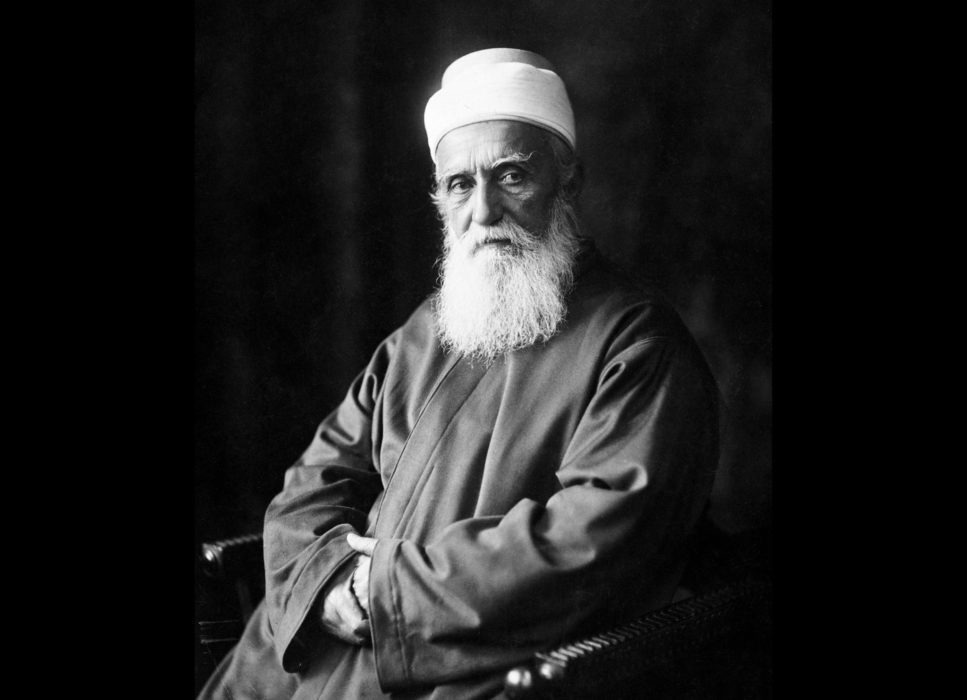THE CHURCH OF THE Ascension in New York’s Greenwich Village hosted ‘Abdu’l-Bahá’s first public talk in America. “Since my arrival in this country I find that material civilization has progressed greatly,” he told them on April 14, 1912, “but spiritual civilization has been left behind.” It was a message that resonated strongly with the congregation. The church was a leading force in America’s Social Gospel movement, a cause born of a belief that Christians must be active agents in the world, devoted to such social justice issues as the alleviation of poverty, and the rights of exploited workers and minorities. Walter Rauschenbusch, its most prominent theologian, argued for “collective salvation.” He contended that Jesus did not die as a substitute for original sin, but rather “to substitute love for selfishness as the basis for human society.”
The imperative of the modern age, ‘Abdu’l-Bahá told the congregation, is to establish a just and peaceful society on a global scale. He noted that political power would never be equal to the task. Faith in racial or national identities would similarly fail. Nothing short of the power of religion, he said, could establish the motivational or ethical foundations needed for a unified world.
Two weeks later, ‘Abdu’l-Bahá was in Chicago laying the cornerstone for a temple to be built along the western shore of Lake Michigan. A crowd of four hundred joined him for the groundbreaking ceremony. The institution of the Bahá’í House of Worship, he told them, as defined by Bahá’u’lláh, was not only a place to pray, but the central edifice in a complex of buildings that would be devoted social, humanitarian, educational, and scientific pursuits. Thousands of them would be built around the world, he said, serving as a model of religion in the service of humankind.

During his first month in America, ‘Abdu’l-Bahá also began an aggressive and sustained critique against religious traditionalism. “Consider the record of religious warfare,” he told an audience in Eliot, Maine, “the battle between nations, the bloodshed and destruction in the name of religion.” When he arrived in America, a war in Tripoli had just broken out. As he was leaving eight months later, the Balkans were under siege. To a congregation at the All Souls Unitarian Church in New York he said that “The greatest cause of human alienation has been religion.” At the Metropolitan Temple on Seventh Avenue at 14th Street he argued: “The counterfeit or imitation of true religion has adulterated human belief.”
‘Abdu’l-Bahá took the leaders of religion to task, whom, he argued, had substituted the ethical and transformative power of religion with dogma, along with politicians who hijacked it in the interests of power and national aggrandizement. “Leaders of religion, in every age,” his father Bahá’u’lláh had written “have hindered their people from attaining the shores of eternal salvation, inasmuch as they held the reins of authority in their mighty grasp.” “Should the lamp of religion be obscured,” Bahá’u’lláh explained, “chaos and confusion will ensue, and the lights of fairness and justice, of tranquility and peace cease to shine.”
On October 12, at the Temple Emanu-El in San Francisco, ‘Abdu’l-Bahá put religion to the test. He asked the congregation to help him consider the record of religion, to see whether it is “the animating impulse of all human advancement,” or “a detriment and a source of degradation to mankind.” They would go to the source — to the founders of religion — to “review the story of Their lives, compare the conditions preceding Their appearance with those subsequent to Their departure.”
‘Abdu’l-Bahá outlined the central events of Jewish history. He emphasized the four hundred years of slavery the Jews suffered at the hands of the Egyptians before Moses led them from captivity. “When a movement fundamentally religious makes a weak nation strong,” he argued, “changes a nondescript tribal people into a mighty and powerful civilization, rescues them from captivity and elevates them to sovereignty, transforms their ignorance into knowledge and endows them with an impetus of advancement in all degrees of development . . . it becomes evident that religion is the cause of man’s attainment to honor and sublimity.”

But even as religion transforms civilization, ‘Abdu’l-Bahá argued, it too must change. While its moral core remains the same throughout time, he explained, its social laws are designed for a specific age. When stubbornly clung to, they become a source of irrationality and decay. ‘Abdu’l-Bahá discussed how the religion of Moses had been renewed by Jesus, and again by Muhammad. Each time the pattern was the same: these founders of the great religions were born into decaying societies, and effected a wholesale transformation in their moral, cultural, educational, and economic character.
‘Abdu’l-Bahá argued repeatedly in America that nothing short of the unifying power of religion could generate global peace and justice in the modern age. His father, Bahá’u’lláh, had re-voiced religion’s eternal teachings, and brought the social guidance needed for an age in which the unification of the planet was within reach. Bahá’u’lláh had abolished the priesthood, challenged people to investigate truth independently from outside influences, urged them to banish all forms of superstition and prejudice, and affirmed that service to the entire human race was the highest form of worship.






